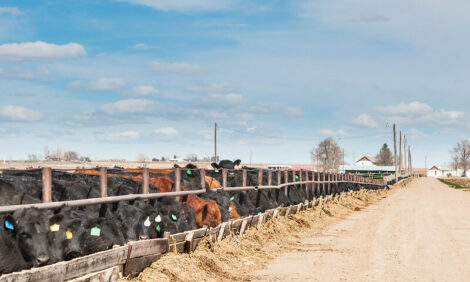



TB Eradication Group to Provide More Support
UK - The bovine TB eradication group presented their first progress report containing recommendations to the Secretary of State on bovine tuberculosis (TB) and progress made in an eradication programme for England.Established in 2008 by the industry, government and vets, the Bovine TB Eradication Group for England this week presented the progress it had made in developing an eradication programme for England.
Recommendations have included providing increased support to farms affected by TB including the creation of more Approved Finishing Units and more 'quarantine' units as a trade outlet for calves.
The Group has proposed that untested calves can move straight to slaughter or via approved collection centres to increase the trade outlets from TB breakdown herds. Dispersal sales will be supported providing disease risks are minimised.
Testing areas will now be based on risk levels, not as they currently are, on parish boundaries.
Meurig Raymond, National Farmers' Union (NFU) Deputy President said that the NFU welcomed the emphasis given to the human cost of bTB in the group’s policy recommendations. "We have long been trying to bring this consequence of the current failing policy into a wider debate and are pleased to see a genuine commitment to support the affected farming families and businesses through proposed policy improvements."
Previously two skin re-tests of inconclusive reactors were allowed. The group has now, considering the increased risk of infection, moved to a single re-test of inconclusive reactors, saying that it will ensure infected animals are removed more rapidly reducing the risks of the disease spreading. This outcome is not likely to be welcomed by farmers.
Mr Raymond said: "We are also pleased that the group has viewed the eradication of TB as an investment in preserving a competitive beef and dairy industry in England; maintaining trade in cattle and dairy products and in protecting public health. At the same time it recognises the substantial cost and effort required in delivering an eradication policy. This echoes the call of the industry over the last few years to Government to deliver policy decisions with courage, commitment, common sense and a transparent scientific review.
"The group proposes a move towards a more risk-based approach to TB controls. For those in the hot-spot areas this should reduce burdens and costs, but for some others these will significantly increase.
"We understand the logic behind the definition of five areas with different testing frequency and control measures but we are conscious that this will impose more frequent testing on some farms, with all the inherent costs and disruption to individual businesses. This reinforces the need for a comprehensive policy aimed at eradication.
"It is refreshing and positive that TBEG has looked at the experience elsewhere to inform its policy recommendations. This has brought it to the conclusion that eradication from cattle is not achievable where there is a wildlife maintenance host. The NFU feels that this is a hugely positive conclusion.
"We are however bitterly disappointed that the remit given to TBEG by the Secretary of State has severely constrained its ability to make a firmer recommendation on dealing with the disease reservoir in the badger population.
"The NFU will support measures which move us towards eradication of TB. Our core concern is that without action on wildlife we cannot make progress towards eradication. We note the reasons given by TBEG for not making recommendations at this stage, and therefore the reality is that there is no prospect of immediate action on this front.
"This situation cannot continue for long. The current policy measures are incomplete, and the NFU will never be able to give its full support to a plan which does not deal with all aspects of the disease."
Further recommendations included looking for a new approach to tackle unconfirmed breakdowns, as they believe that current measures do not accurately reflect the levels of risk in some herds.
The Secretary of the State has approved all the Group's recommendations.
Despite the government's policy, the Group has said that the possibility of a badger cull is still open, however it added that no single measure alone will eradicate bovine TB. The Group also believes that vaccination will play a significant role in the eradication process.
Last year 40,000 cattle were destroyed because of TB, while taxpayers spent £84 million on bovine TB controls in England in 2008/09.
TheCattleSite News Desk


